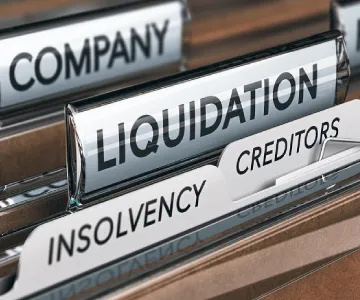Liquidation Audit Services in UAE
Liquidation Audit Services in UAE
Once a company in the UAE is planning to close, it is required to pass through a liquidation audit, which is a legal procedure to make sure all financial records, liabilities and assets are properly recorded before it is deregistered. At Farahat & Co., we assist companies to fulfill all regulatory and financial needs during siddolution, taking into consideration the UAE Government standards, Free Zones authorities, and international auditor standards.
Liquidation begins when a company has to decide to wind up its business operations due to financial distress. It is a very sensitive phase that requires a lot of professional skills. At Farahat & Co., we render highly customized services as per your company’s specifications. In our service, the auditors look into the books in a manner that every minutest thing regarding all assets and liabilities is checked; all creditors and shareholders are treated fairly and equitably throughout the entire process of company closure. The settlement of financial inspection brings about proof of honesty on the final financial records of your business. We take this responsibility with the highest professionalism and ethics it deserves.
Our company closure audit leaves no stone unturned when it thoroughly reviews and assures complete protection for all parties of interest. Be assured that this sensitive process shall be undertaken with complete diligence and transparency at Farahat & Co.
What is Liquidation?
A liquidated company is the one that is officially terminated, and it is the company that is no longer involved in commerce. The procedure will provide equitable treatment to creditors, shareholders, and other stakeholders without violating the UAE laws. Companies that are thinking about company liquidation in Dubai ought to hire licensed professionals to prevent legal issues and to have transparency. Farahat & Co. is one such firm who can help in deregistation of companies in the UAE.

Benefits of Professional Liquidation Services
Risk Management and Legal Compliance
Using licensed liquidation consultants reduces risks associated with regulatory violations. Professionals ensure that deregistration processes and license cancellations are handled according to UAE laws, minimizing potential penalties.
Time and Cost Efficiency
Professional services can complete liquidation and deregistration efficiently, often within 45 days for mainland companies. This saves time and reduces administrative costs, ensuring faster closure.
Protecting Stakeholders and Reputation
Engaging experts like Farahat & Co ensures:
- Issuance of official Liquidation Certificates
- Structured debt settlements and shareholder distributions
- Preservation of company and stakeholder reputations

Why Liquidation Audits Are Essential for UAE Companies
A disolution audit is not a mere official step, it is a legal measure that ensures adherence, avoids conflict, and leaves the stakeholders safe.
Regulatory Compliance.
All corporations engaged in the UAE are required to adhere to the UAE corporate laws, Free Zone regulations, and Federal auditing standards in the process of dissolution.
Company closure audit is to ensure that your business has paid off all state duties and received the approval of the UAE Audit Agency or any other Free Zone Authority, such as DED, DMCC, DAFZA, or JAFZA.
Reduce Legal and Financial risks.
Liquidation audits ensure that penalties for non-compliance are minimized, court orders are being met, and all trade license compliances are in place.
Our team will make sure that your company closure process is compliant and reportable in all aspects – we will make sure that you are able to close your business in an orderly and legal manner.
Gain Credibility among Stakeholders.
An open company closure audit promotes trust among shareholders, investors, and creditors. It shows that every issue of finance is conducted in an ethical manner and in line with the UAE laws, such as the allocation of assets, and the settlement of liabilities.
Contact Us

Guide to Company Dissolution and Liquidation Process in the UAE
How Is the Dissolution Process Managed?
We preside over the whole company dissolution process including:
- Trade license cancellation
- Asset sales or distribution
- Settlement of liabilities
- Equipment for shareholder resolutions.
- Final audit reports are submitted.
What Audit and Financial Assessment Services Are Included?
Our auditors conduct company closure testing and post company closure audits to verify the financial correctness. This includes:
- Audit of accounting documents.
- Internal audit checks
- Checking cash flow and debts.
- Final dissolution reports preparation.
Contact Us
Types of Liquidation in UAE (Voluntary vs. Compulsory)
| Voluntary Liquidation | Compulsory Liquidation | Legal Framework Governing Liquidation |
|---|---|---|
This comes into being when the shareholders make a decision to shut down a solvent company at will. The process involves:
Adoption of reputable liquidators such as Farahat & Co. is a way of making sure that the process is easy and conforming. | Regulatory authorities or a court initiate compulsory liquidation in cases of an insolvent or regulation-breaking company. Common causes include:
An approved liquidator in Dubai is a person who is appointed for a smooth deregistration process to protect the creditors and close the process in a lawful manner. | The UAE’s liquidation process is regulated by several key laws:
Compliance with these laws guarantees that liquidation is executed legally, safeguarding both company and stakeholder interests. |

How Is Financial and Accounting Support Provided During Liquidation in the UAE?
How Are Assets and Liabilities Managed?
We handle all the financial matters of winding up of businesses:
- Assets Appraisal and Sale.
- Payment of liabilities and debts.
- Financial statement review.
- Fund Utilization and Cash Conversion.
Financial Operations and risk Management.
Our auditors also offer complete support in their services to debt management, recovery of investments, and an internal control audit where discrepancies are identified to reduce legal liabilities.
Contact Us

What Are the Common Causes and Triggers for Liquidation in the UAE?
Financial distress. Persistent losses. Absence of liquidity can trigger company closure process for your business in UAE. Some of them have been explained below.
Financial Causes
- Ongoing financial hardship/bankruptcy.
- Difficulties or incompetence to pay.
- Constant losses in operations.
Operational and Strategic Causes.
- Restructuring businesses or M&A.
- Shareholder wrangles or dissolution.
- Failure to be registered or inactivity.
- The changes in the market or technological disturbances.
Legal or Regulatory Causes
- Court-ordered dissolution
- Regulatory non-compliance
- Lapse of renewal of trade licenses or inability to fulfill the UAE legal requirements.
What Are the Benefits of Hiring Professional Liquidation Audit Services?
- Reduce Legal and Financial Risks
We protect your company from penalties, court orders, and compliance breaches through verified liquidation audits.
- Enhance Operational Efficiency
Our structured approach ensures smooth business closure, streamlined dissolution, and optimized internal controls.
- Ensure Stakeholder Confidence
A transparent, professional liquidation process builds trust among shareholders, investors, and regulatory authorities.

Auditor’s Role in Company Liquidation
In case a organization goes into liquidation, an independent auditor is supposed to supervise the process of settlement. The role an auditor plays in the company closure includes:
- Verification of the records:
The accounting inspector(auditor) check the correctness and completeness of the financial position from the documents of the organization, including financial statements, ledgers, accounts, and other accounting records of a similar nature. The verification is essential to ensure that they reflect the financial transactions of the organization and have been prepared in conformity with the accounting standards.
- Identification and Valuation of the Assets: It is the process through which the company’s assets are identified and valued. The auditor verifies the physical assets, such as land and buildings, inventory, and intangible assets in this process.
- Liabilities Assessment: The other thing the financial inspector(auditor) is going to do is to evaluate the company’s liabilities to find the priority of payments. This may be about repaying loans, payables, or other liabilities.
- Monitoring the Company Closure Process: The auditor monitors the whole process of company closure and reviews it for the purpose of establishing whether the proceedings have been conducted in accordance with the statutory requirements and the interests of creditors and stakeholders have been taken care of.
- Reporting and Documentation: The final report of the financial inspection is written by the auditor after the accounting assessment is completed. It is supposed to contain full disclosure of the findings, conclusions, recommendations, and distribution of assets and liabilities.
Contact Us

Deregistration Process for Companies
When deregistration is applicable?
Deregistration is appropriate in a situation where the company has ceased operation and is not planning to engage in a business in the future. Common scenarios include:
- Lapsed and unrenewed licenses.
- Organizations that do not have business.
- Liquidation procedures done.
Deregistration entails informing the Federal Tax Authority (FTA), especially where it is registered under VAT and bringing to an end all business transactions.
Involved Regulatory Authorities (DED, DMCC, JAFZA, Free Zones)
The procedure of deregistration will be determined by the jurisdiction of a company:
- Dubai Economic Department (DED): regulates companies on the mainland.
- Dubai Multi Commodities Center (DMCC): Deals with free zones.
- The deregistration process is done by Jebel Ali Free Zone Authority (JAFZA), and other free zones.
The rest of the authorities are MOHRE, telecommunication providers and utility clearances by Emirates post.
Documents and Clearances required to be present
Deregistration of a company is usually required with the following documents:
- Liquidation form
- Cancellation of certificate of license.
- Notarized shareholder resolutions and Memorandum of association (MOA).
- Tax clearance/No Objection Certificates (NOCs).
- Deregistration fees and official letters of acceptance paid.
By hiring professional consultants such as Farahat & Co., no cases of delay and legal complications will arise because of the proper preparation of all the documentation.

Financial and Audit Considerations
Paying of the Debts and Obligations
Settling of all forms of debts is a very critical aspect of liquidation. This involves:
- Prioritization and identification of creditors.
- Disposing assets in the company to pay off debts.
- Paying out remaining cash to shareholders.
Having a sound financial management safeguards the company as well as its stakeholders in the process of liquidation.
Role of Licensed Auditors in Liquidation
Licensed auditors oversee the liquidation process to ensure compliance with international accounting standards (IAS/IFRS) and local regulations. Their responsibilities include:
- Preparing a detailed liquidation audit report
- Valuing assets and managing fund distribution
- Ensuring transparency and accurate financial reporting
Maintaining Transparency and Compliance
Professional liquidation services maintain clear communication with stakeholders, control company assets, and ensure all regulatory requirements are fulfilled. This transparency protects the company’s reputation and prevents legal disputes.

The Liquidation Audit Report
Among all, a liquidation inspection report is the most important, and this is being asked by the authorities at the time of the settlement of a company. It comes in handy because it gives a very clear and transparent picture regarding the financial health of the organization at the time of liquidation. Some of the most important components of the UAE liquidation inspection report include:
- Introduction and Background: This includes the corporate overview and the registration of the company’s legal status in the industry, and is then succeeded by descriptions of the causes of settlement.
- Scope and Objectives: This contains the scope and objectives of the liquidation inspection, whereby it gives details of the areas examined and the purpose of the financial inspection engagement.
- Audit Methodology: It details the process of the financial inspection procedures and techniques that have been conducted by the auditors to be able to perform the financial inspection, which includes document review, data analysis, interviews, and verification processes.
- Findings and Observations: In this area, the auditor reports the findings of the audit, which are observations, irregularities, discrepancies, or any areas of concern arising from the financial inspection. This will include the issues in the financial records the problems with the valuation of the assets or the various issues that arose as a result of non-compliance with laws and regulations or from any suspected activities of fraud.
- Analysis of financial position: This is done by conducting a financial analysis of the company, which indicates the assets, liabilities, and overall financial position. This enables the stakeholders to view the financial position of the organization and helps in the fair distribution of the assets to the creditors.
- Compliance assessment: A report on the compliance audit will also be drawn up to examine whether the organizationcomplies with all UAE applicable legislation and laws concerning the liquidation of companies, including but not limited to UAE Federal Law No. 32 of 2021 on Commercial Companies, the UAE Bankruptcy Law, Federal Decree-Law No. 9 of 2016, and any other related legislation and regulations.
- Recommendations: Based on the findings and observations, the auditors make recommendations for the liquidator and other stakeholders. Such recommendations may call for process improvement, addressing identified issues, or taking specific actions to protect the interests of the creditors and stakeholders.
- Supporting Documents: The report will normally have relevant documents that support the findings of the audit process. These include the financial statements, legal documents, financial inspection working papers, and other evidence gathered in the course of the financial inspection
Contact Us

How to Do Liquidation Audit Services for Small Businesses?
- Liquidation audit assists the small businesses to shut down their operations as well as maintaining financial compliance.
- On the one hand, it is necessary to evaluate all liabilities, assets, and outstanding obligations.
- Check financial statements, cash flow and bank accounts.
- Check on claims of creditors, employee dues and taxes.
- Physically verify such assets as inventory and equipment.
- E.g. define unpaid bills, outstanding invoices, and contract liabilities.
- Make a detailed audit report with financial positions and recommendations.
- Make sure that all transactions are done in accordance with the UAE Commercial Companies Law and regulations (NAK Auditing L.L.C., 2025)
- Seek professional auditors to prevent any legal confrontations or fines in the course of liquidation.

How to Choose a Liquidation Auditor?
- Hire a registered and qualified auditor accepted by UAE authorities.
- Request auditors to be experienced in liquidation and corporate closure audits.
- Examine the past record of the firm with other firms.
- Make the auditor familiar with regulatory compliance, tax settlements and creditor requirements.
- Test audit scope, procedure and cost transparency.
- Find auditors with elaborate reports and advisory.
- Take into account companies that provide assistance during the liquidation process such as legal and financial services.
- Selecting the appropriate auditor reduces the risks and the business closure is not a problem.

What Documents Are Needed for a Liquidation Audit?
- Complete financial statements including balance sheets, profit & loss, and cash flow statements
- Reports on bank statements and reconciliations.
- Creditor, debtor and outstanding invoice records (Rewind Consultancy, 2024)
- Payroll document, employee agreements and payout information.
- Tax filings and VAT records
- Asset registers and property, equipment and inventory supporting documentation.
- Past audit reports and compliance certificates.
- Contracts, sticky and agreements with the client, suppliers and service providers.
- Liquidation audit services in Dubai Liquidation audit services in Dubai assist in the smooth closure of business, compliance with the regulations and proper financial reporting

Why Choose Farahat & Co. for Liquidation Audit in UAE?
Farahat & Co. is one of the leading audit firms in Dubai, engaged in all the necessary services to be conducted in the process of implementing the settlement. Our independent auditors and business professionals ensure high levels of professional handling and diligence in the financial assessment process. We prepare and submit reports for liquidations before the appropriate regulating body with a lot of diligence.
We are more than happy to provide a full company closure service solution that includes document submissions for settlement purposes, the cancellation of utility connections, obtaining clearances, the closure of bank accounts, no-liability certificates, audited financial statements, and final company closure reports. We also undertake the business settlement in Dubai, be it on the mainland, in the free zones, and offshore across the UAE.
Contact us now to find out more about our liquidation audits and how they can help you make sure you have a well-thought-out and navigated process.
Contact Us
Conclusion
The process of company liquidation and deregistration in the UAE must be properly planned, legally organized, and transparent in terms of finances. By contracting professional services such as Farahat & Co., the process of closing the company will be smooth, efficient and legally acceptable. Licensed & trusted liquidators and expert advisors secure stakeholders, handle debts, and save reputations whether it is voluntary or compulsory liquidation, and business owners are able to shut their operations without qualms.
Frequently Asked Questions.
What is a liquidation audit in the UAE?
When is a liquidation audit required in the UAE?
Can liquidation be done without an audit?
How long does a liquidation audit take?
Who can perform a liquidation audit in the UAE?
What are the benefits of a liquidation audit?
Why is a liquidation audit important?
+971 52 6922588 | Tel: +971 4 2500251 | E-mail: sales@farahatco.com